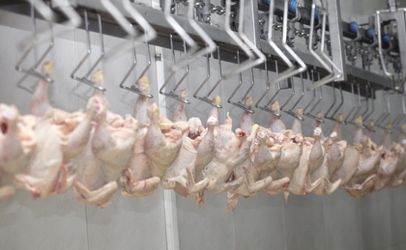(Mike Robach, vice president of corporate food safety, quality and regulatory affairs for Cargill Inc., was interviewed for the FRONTLINE documentary, “The Trouble with Chicken,” which aired May 12, 2015.)
There were a couple of points I made in the FRONTLINE interview that were left on the editing floor.  My opinion that Salmonella does not meet the level of concern as an adulterant was made in comparison to the adulterant status of E. coli O157:H7 in beef products. Ten cells of O157:H7 is capable of causing illness, whereas Salmonella normally has an infectious dose of around 1,000 cells based on work summarized by FAO. Based on this difference, Cargill’s Salmonella control focuses on levels of Salmonella in ground turkey as well as focusing on monitoring prevalence in accordance with USDA performance standards. We are in agreement with Dr. Bill James that the performance standard based on prevalence has not impacted the level of salmonellosis in humans caused by meat and poultry, and we need to be looking at the number of cells, not whether a product contains or does not contain Salmonella regardless of the level. By implementing a program that measures both prevalence and level of Salmonella and finding product that test positive at a higher level of Salmonella and removing it from the fresh marketplace, the risk of causing illness can be reduced. Another point I made during the interview concerns the use of antibiotics in animal agriculture. Along with good animal management practices, the responsible, judicious use of antibiotics helps advance public health, food safety, and animal health and well-being. There is no scientific consensus that antibiotic use in animals leads to a public health concern. The antibiotics to which the Salmonella Heidelberg involved in our 2011 ground turkey recall were resistant included tetracycline, gentamycin, streptomycin, and penicillin. None of these antibiotics are used in front-line therapy for human salmonellosis. Any proposals to change the use of antibiotics in animals should be based upon comprehensive, scientific analysis and risk-based evaluations that can ensure a public health benefit and avoid unintended consequences for human and animal health, well-being and food safety. Cargill does support judicious use of antibiotics under the direction of a veterinarian and the elimination of the use of antibiotics of human health importance for the purposes of animal growth promotion. As we improve food production systems, sometimes it is necessary to challenge the conventional wisdom in order to make necessary improvements. In the case of the control of human salmonellosis, it seems that now may be a time to challenge the wisdom of relying solely on qualitative measures and to incorporate other quantitative measures in order to make significant human health risk reductions.
My opinion that Salmonella does not meet the level of concern as an adulterant was made in comparison to the adulterant status of E. coli O157:H7 in beef products. Ten cells of O157:H7 is capable of causing illness, whereas Salmonella normally has an infectious dose of around 1,000 cells based on work summarized by FAO. Based on this difference, Cargill’s Salmonella control focuses on levels of Salmonella in ground turkey as well as focusing on monitoring prevalence in accordance with USDA performance standards. We are in agreement with Dr. Bill James that the performance standard based on prevalence has not impacted the level of salmonellosis in humans caused by meat and poultry, and we need to be looking at the number of cells, not whether a product contains or does not contain Salmonella regardless of the level. By implementing a program that measures both prevalence and level of Salmonella and finding product that test positive at a higher level of Salmonella and removing it from the fresh marketplace, the risk of causing illness can be reduced. Another point I made during the interview concerns the use of antibiotics in animal agriculture. Along with good animal management practices, the responsible, judicious use of antibiotics helps advance public health, food safety, and animal health and well-being. There is no scientific consensus that antibiotic use in animals leads to a public health concern. The antibiotics to which the Salmonella Heidelberg involved in our 2011 ground turkey recall were resistant included tetracycline, gentamycin, streptomycin, and penicillin. None of these antibiotics are used in front-line therapy for human salmonellosis. Any proposals to change the use of antibiotics in animals should be based upon comprehensive, scientific analysis and risk-based evaluations that can ensure a public health benefit and avoid unintended consequences for human and animal health, well-being and food safety. Cargill does support judicious use of antibiotics under the direction of a veterinarian and the elimination of the use of antibiotics of human health importance for the purposes of animal growth promotion. As we improve food production systems, sometimes it is necessary to challenge the conventional wisdom in order to make necessary improvements. In the case of the control of human salmonellosis, it seems that now may be a time to challenge the wisdom of relying solely on qualitative measures and to incorporate other quantitative measures in order to make significant human health risk reductions.
